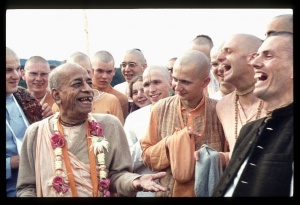SB 5.5.25: Difference between revisions
No edit summary |
(Vanibot #0054 edit - transform synonyms into clickable links, which search similar occurrences) |
||
| Line 23: | Line 23: | ||
<div class="synonyms"> | <div class="synonyms"> | ||
''mattaḥ'' | ''[//vanipedia.org/wiki/Special:VaniSearch?s=mattaḥ&tab=syno_o&ds=1 mattaḥ]'' — from Me; ''[//vanipedia.org/wiki/Special:VaniSearch?s=api&tab=syno_o&ds=1 api]'' — even; ''[//vanipedia.org/wiki/Special:VaniSearch?s=anantāt&tab=syno_o&ds=1 anantāt]'' — unlimited in strength and opulence; ''[//vanipedia.org/wiki/Special:VaniSearch?s=parataḥ&tab=syno_o&ds=1 parataḥ] [//vanipedia.org/wiki/Special:VaniSearch?s=parasmāt&tab=syno_o&ds=1 parasmāt]'' — higher than the highest; ''[//vanipedia.org/wiki/Special:VaniSearch?s=svarga&tab=syno_o&ds=1 svarga]-[//vanipedia.org/wiki/Special:VaniSearch?s=apavarga&tab=syno_o&ds=1 apavarga]-[//vanipedia.org/wiki/Special:VaniSearch?s=adhipateḥ&tab=syno_o&ds=1 adhipateḥ]'' — able to bestow happiness obtainable by living in the heavenly kingdom. by liberation, or by enjoyment of material comfort and then liberation; ''[//vanipedia.org/wiki/Special:VaniSearch?s=na&tab=syno_o&ds=1 na]'' — not; ''[//vanipedia.org/wiki/Special:VaniSearch?s=kiñcit&tab=syno_o&ds=1 kiñcit]'' — anything; ''[//vanipedia.org/wiki/Special:VaniSearch?s=yeṣām&tab=syno_o&ds=1 yeṣām]'' — of whom; ''[//vanipedia.org/wiki/Special:VaniSearch?s=kim&tab=syno_o&ds=1 kim]'' — what need; ''u'' — oh; ''[//vanipedia.org/wiki/Special:VaniSearch?s=syāt&tab=syno_o&ds=1 syāt]'' — can there be; ''[//vanipedia.org/wiki/Special:VaniSearch?s=itareṇa&tab=syno_o&ds=1 itareṇa]'' — with any other; ''[//vanipedia.org/wiki/Special:VaniSearch?s=teṣām&tab=syno_o&ds=1 teṣām]'' — of them; ''[//vanipedia.org/wiki/Special:VaniSearch?s=akiñcanānām&tab=syno_o&ds=1 akiñcanānām]'' — without needs or without possessions; ''[//vanipedia.org/wiki/Special:VaniSearch?s=mayi&tab=syno_o&ds=1 mayi]'' — unto Me; ''[//vanipedia.org/wiki/Special:VaniSearch?s=bhakti&tab=syno_o&ds=1 bhakti]-[//vanipedia.org/wiki/Special:VaniSearch?s=bhājām&tab=syno_o&ds=1 bhājām]'' — executing devotional service. | ||
</div> | </div> | ||
Latest revision as of 22:19, 18 February 2024

A.C. Bhaktivedanta Swami Prabhupada
TEXT 25
- matto 'py anantāt parataḥ parasmāt
- svargāpavargādhipater na kiñcit
- yeṣāṁ kim u syād itareṇa teṣām
- akiñcanānāṁ mayi bhakti-bhājām
SYNONYMS
mattaḥ — from Me; api — even; anantāt — unlimited in strength and opulence; parataḥ parasmāt — higher than the highest; svarga-apavarga-adhipateḥ — able to bestow happiness obtainable by living in the heavenly kingdom. by liberation, or by enjoyment of material comfort and then liberation; na — not; kiñcit — anything; yeṣām — of whom; kim — what need; u — oh; syāt — can there be; itareṇa — with any other; teṣām — of them; akiñcanānām — without needs or without possessions; mayi — unto Me; bhakti-bhājām — executing devotional service.
TRANSLATION
I am fully opulent, almighty and superior to Lord Brahmā and Indra, the King of the heavenly planets. I am also the bestower of all happiness obtained in the heavenly kingdom and by liberation. Nonetheless, the brāhmaṇas do not seek material comforts from Me. They are very pure and do not want to possess anything. They simply engage in My devotional service. What is the need of their asking for material benefits from anyone else?
PURPORT
The perfect brahminical qualification is stated herein: akiñcanānāṁ mayi bhakti-bhājām. The brāhmaṇas are always engaged in the devotional service of the Lord: consequently they have no material wants, nor do they possess material things. In Caitanya-caritāmṛta (CC Madhya 11.8), Caitanya Mahāprabhu explains the position of pure Vaiṣṇavas who are anxious to return home, back to Godhead. Niṣkiñcanasya bhagavad-bhajanonmukhasya. Those who actually want to return back to Godhead are niṣkiñcana—that is, they have no desire for material comfort. Śrī Caitanya Mahāprabhu advises, sandarśanaṁ viṣayinām atha yoṣitāṁ ca hā hanta hanta visa-bhakṣaṇato 'py asādhu: material opulence and sense gratification through the association of women are more dangerous than poison. Brāhmaṇas who are pure Vaiṣṇavas always engage in the Lord's service and are devoid of any desire for material gain. The brāhmaṇas do not worship demigods like Lord Brahmā, Indra or Lord Śiva for any material comfort. They do not even ask the Supreme Lord for material profit; therefore it is concluded that the brāhmaṇas are the supreme living entities of this world. Śrī Kapiladeva also confirms this in Śrīmad-Bhāgavatam (SB 3.29.33):
- tasmān mayy arpitāśeṣa-
- kriyārthātmā nirantaraḥ
- mayy arpitātmanaḥ puṁso
- mayi sannyasta-karmaṇaḥ
- na paśyāmi paraṁ bhūtam
- akartuḥ sama-darśanāt''
The brāhmaṇas are always dedicated to the Lord's service with their bodies, words and mind. There is no better person than a brāhmaṇa who thus engages himself and dedicates himself to the Supreme Lord.